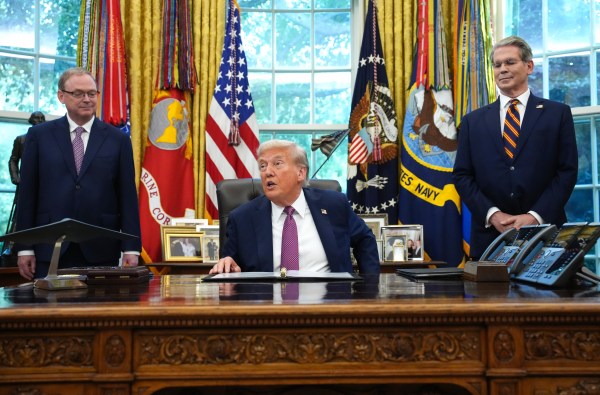Happy Wednesday! And happy birthday to TMD! Five years ago today, Declan and our old pal Andrew Egger published the first edition of this newsletter. It didn’t have Quick Hits yet, but what it did have was, well, a whole lot of heart.
To those of you who have been with us since Day 1—thanks. To those of you just joining us, we’re glad you’re here. We know we speak for current and former Morning Dispatchers when we say it’s been a pleasure to share the last five years with you. Here’s to many more years of ribbing Steve about his sports teams!
Quick Hits: Today’s Top Stories
- In a press conference on Tuesday, State Department spokesman Matthew Miller said that the U.S. government supports Israel’s recent military operations targeting Hezbollah, the Iran-backed, Lebanon-based terrorist organization, and is no longer in favor of a ceasefire between the two parties. “The situation on the ground has changed,” Miller said, responding to the reversal.
- The largest public water and wastewater utility company in the U.S., American Water, said Monday that it was the victim of a cybersecurity attack after detecting “unauthorized authority” on its online network and computer systems late last week. While the company—which provides service for about 14 million customers across 24 states—said that all of its water and wastewater utility services appear to be unaffected by the cybersecurity breach, it was nevertheless temporarily pausing billing. Law enforcement is investigating the hack, though it’s not yet clear who was responsible.
- New York City First Deputy Mayor Sheena Wright, a longtime ally to New York City Mayor Eric Adams, resigned from her position on Tuesday, less than two weeks after the Justice Department indicted Adams on a series of bribery and campaign finance charges. Early last month, federal investigators seized Wright’s phone, along with those of her brother-in-law and her husband—both of whom have recently resigned from positions in the Adams administration. The New York Times first reported Wright’s resignation on Tuesday morning, and Adams confirmed her departure later in the day, announcing that Maria Torres-Springer—a current New York City deputy mayor for housing, economic development, and workforce—will succeed Wright.
- A U.S. State Department official claimed on Monday that China is intentionally oversupplying lithium to “lower the price until competition disappears.” Speaking from Portugal—Europe’s largest producer of the mineral key to battery production—Jose Fernandez, undersecretary for economic growth, energy and the environment, told reporters China was engaged in “predatory pricing” of the mineral. Lithium prices plummeted by 80 percent in 2023 and have fallen 21 percent this year.
- The Royal Swedish Academy of Sciences awarded the 2024 Nobel Prize in Physics to American physicist John Hopfield and British-Canadian computer scientist Geoffrey Hinton for research and discoveries “that enable machine learning with artificial neural networks,” technological innovations that led to modern artificial intelligence technologies. Hopfield and Hinton developed distinct networks inspired by the human brain that use physics for machine learning.
- The National Hurricane Center warned on Tuesday that Hurricane Milton’s “intensity has rebounded,” as the Category 5 storm—with sustained winds of 160 miles per hour—is projected to hit the Tampa Bay area on Wednesday. Thirteen Florida counties are now under mandatory evacuation orders. “I can say this without any dramatization whatsoever: If you choose to stay in one of those evacuation areas,” Tampa Mayor Jane Castor said on Monday, “you are going to die.” President Joe Biden announced on Tuesday he had canceled his trip to Germany and Angola to prepare for hurricane recovery operations, and warned, “This could be the worst storm to hit Florida in over a century.”
- Filipino government officials said on Tuesday that four Chinese vessels—three from the Chinese Coast Guard and one from the Navy—attempted to block Filipino civilian fishing vessels from delivering supplies to other fishermen in the South China Sea by firing water cannons at the fishing boats. A Chinese Coast Guard spokesman said on Tuesday that its ships “took control measures” against Filipino ships, alleging they intruded into Chinese waters. The conflict occurred near the Scarborough Shoal, a fishing zone that both China and the Philippines claim.
- Attorneys general from 13 states and Washington, D.C., sued the video-based social media app TikTok on Tuesday, accusing the platform of harming young users’ mental health and deceiving the public about the platform’s safety. Led by New York Attorney General Letitia James and California Attorney General Rob Bonta, the lawsuit alleges TikTok manipulated users into “compulsive and excessive use,” and was aware its product “caused ongoing harm to young users but failed to adequately warn users or remedy the product’s defects.” TikTok pushed back on allegations in the suit, saying the claims were “inaccurate and misleading.”
- The Biden administration issued new sanctions on Tuesday against Algoney Hamdan Daglo Musa—a senior leader in the Rapid Support Forces (RSF)—for enabling the RSF’s wartime operations in Sudan that led to “brutal RSF atrocities against civilians, which have included war crimes, crimes against humanity, and ethnic cleansing.” The RSF—a paramilitary group allied with mostly Arab militias—has been embroiled in a civil war with the Sudanese Armed Forces since April 2023. State Department spokesman Matthew Miller said that, despite warnings from the U.S. and other entities, the RSF has continued its atrocities against civilian populations, “including those involving sexual violence and ethnically targeted attacks on non-Arab groups.”
Noncitizens Voting? Facts vs. Fiction.

During September’s debate, former President Donald Trump claimed that Democrats were in favor of illegal immigration as part of a concerted plan to gain more voters. “Our elections are bad,” he said. “And a lot of these illegal immigrants coming in, they’re trying to get them to vote. They can’t even speak English. They don’t even know what country they’re in, practically. And these people are trying to get them to vote. And that’s why they’re allowing them to come into our country.”
Vice President Kamala Harris and other Democrats dismissed the claim as partisan fearmongering. But many Republican elected officials at the federal, state, and local levels are acting as if the prospect of illegal immigrants voting will be a major issue in the upcoming election—a claim that seems likely to resurface if Trump loses in November.
Voting as a noncitizen at the federal level is already illegal, but it can be allowed at the state and local level—but even that is quite rare, limited to a scattering of municipalities around the country.
At the federal level, Republican efforts to pass laws safeguarding against noncitizen voting have been largely stymied. Rep. Chip Roy, a Republican from Texas, introduced the Safeguard American Voter Eligibility (SAVE) Act in May of this year. The bill would require people to present proof of citizenship in person when registering to vote in a federal election, and would create an avenue for penalties against election workers if they did register noncitizens to vote. “Secure elections are a key cornerstone for any representative government; without them, we won’t have a country,” he said of why he’d introduced the bill. “Radical progressive Democrats know this and are using open border policies while also attacking election integrity laws to fundamentally remake America.”
Roy’s efforts were backed—at least for a time—by House Speaker Mike Johnson. “Many of the Democrats want all of these illegals to participate in our federal elections,” he said in July. “They want them to vote. There’s no other conclusion that you can draw. When the White House announced that they would veto the bill, they effectively handed our elections over to all of these illegal aliens that have come here.”
The bill passed out of the House in July by a vote of 221-198. There were five Democratic votes for the measure, all moderates in competitive reelection fights, including Reps. Jared Golden of Maine and Henry Cuellar of Texas. The legislation is likely dead on arrival in the Senate, and it died a second death, of sorts, when a version of it was stripped from a bill that extended government funding past the end of the fiscal year.
Trump, Roy, Johnson, and their allies—in their desire to “thwart Democrat efforts to cement one-party rule,” as a fact sheet from Roy’s office put it—were echoing arguments, made frequently at the state and local level in the last few years, that illegal immigrants are a key part of Democratic attempts to “rig” elections. For example, when lawyers for the Trump campaign in Arizona attempted to contest the results of the 2020 election there, they claimed that tens of thousands of noncitizens had voted, an argument that special prosecutor Jack Smith noted in his court filing as part of the criminal case alleging that Trump knowingly made false claims about the election:
The conspirators started with the allegation that 36,000 noncitizens voted in Arizona; five days later, it was ‘beyond credulity that a few hundred thousand didn’t vote’; three weeks later, ‘the bare minimum [was] 40 or 50,000. The reality is about 250,000’; days after that, the assertion was 32,000; and ultimately, the conspirators landed back where they started, at 36,000 — a false figure that they never verified or corroborated.
Such claims have spread far and wide on the right. Eight state legislatures dominated by Republicans—in Iowa, Idaho, Kentucky, Missouri, North Carolina, Oklahoma, South Carolina, and Wisconsin—are voting in November on ballot measures that would block municipalities and counties from allowing noncitizens to vote in local elections.
Some GOP officials have already moved to audit voter rolls in an effort to allay concerns. In 2022, Georgia Secretary of State Brad Raffensberger found that 1,634 noncitizens had attempted to register to vote in Georgia between 1997 and 2022, and he required that all voting places post signs warning voters that voting as a noncitizen is illegal. Another updated audit is ongoing.
Raffensberger’s office concluded that the audit and other measures were signs that Georgia’s elections would be secure, and indeed, as the Dispatch Politics crew reported last week, the GOP has generally been sanguine about election security in 2024—with concerns about noncitizen voting being a marked exception. As Steve Roberts, a Republican election lawyer, noted at a Heritage Foundation event last week, “we’re seeing [election safeguards] restored through a lot of hard work by the Trump team, by the RNC, by a lot of you here in this room.”
But that optimism is perhaps not uniform, if the past is any guide. A Reuters examination of the election boards—responsible for conducting elections at the local level—of the five largest counties in seven battleground states found that 16 out of 35 boards had at least one member who questioned the results of the 2020 election, citing fraud, a cover-up, or doubts about the integrity of voting machines. It is unclear how widespread concern could play out on Election Day this year, but it remains a possibility that local officials will cast doubt on the process.
Claims of noncitizen voting could play a role again in another Trump “Stop the Steal” effort if he loses in November. The Site Formerly Known as Twitter is full of such allegations already, and Trump has frequently said on the campaign trail in recent days that the only way he could lose is if the other side was cheating. As our own John McCormack pointed out last month, Republican-dominated election boards could potentially refuse to certify election results, although in all likelihood they would be quickly forced to certify through legal action. But widespread confusion and some degree of chaos on Election Day and in the days after might be the upshot of GOP legal maneuvering.
In Arizona, noncitizen voting is already front-and-center after the state’s Supreme Court ruled last month that more than 200,000 people whose citizenship status is uncertain because of a database error would be allowed to receive full ballots in November. Voters in Arizona are required to show proof of citizenship to vote in state and local elections. The error, Democratic Secretary of State Adrian Fontes said last month, affected more registered Republicans than Democrats or independents.
America First Legal—a nonprofit group run by former Trump aide Stephen Miller, who was behind the former president’s immigration policy—seems to be champing at the bit to litigate noncitizen voter claims. On Thursday, the group announced it is suing Fontes to try to force him to release the names of the more than 200,000 people whose citizenship status is unclear, many of whom may have been on voter rolls for more than two decades. “Anyone who tries to tell you that there aren’t illegal aliens or noncitizens who have lied on this form is lying to you,” the group wrote in a lengthy tweet last week, concluding, “This is not a conspiracy, and this is not a warning of what *might* happen. This is happening right now. This is the reality under the Biden-Harris Administration.”
TMD reached out to several swing-state secretaries of state, though none were available to comment before we published.
John Fortier, a senior fellow at the American Enterprise Institute and an expert on election procedures, told TMD that while there was a kernel of truth to claims that noncitizens might be attempting to, and even occasionally succeeding at, voting, it is extremely unlikely that it would be in numbers large enough to sway any major election.
He cautioned, however, that it is difficult to get a comprehensive picture because of the decentralized nature of election administration. “States have the responsibility for keeping their [voter] lists up to date, but we do find sometimes, when people have cleaned their lists up, they find names of people who are not citizens on the list,” he said. “It does happen. Rarer is finding evidence that someone voted, who is on the list. It’s likely rare because most people’s name on the list, you could say is either by accident or that they weren’t intending to vote.”
Indeed, to the extent it’s available, the evidence for wide-scale, concerted attempts at election fraud is thin. A 2017 survey from the progressive Brennan Center for Justice of 44 election administrators in 12 states, collectively responsible for tabulating 23.5 million votes, found that only 30 incidents of suspected noncitizen voting for further investigation, an incidence rate of 0.0001 percent.
In 2o20, Alex Nowrasteh of the libertarian Cato Institute critiqued systemic measurement and design errors in an oft-cited 2014 study estimating that 15.8 percent of noncitizens voted in the 2008 elections, which would translate to millions of voters in most estimates of the size of the U.S. illegal immigrant population at the time.
Nowrasteh concluded that the report relied on flawed data, primarily due to survey errors where citizens mistakenly identify themselves as noncitizens. “There is no doubt that a non-zero number of non-citizens illegally voted, but there is no good evidence that noncitizens voted illegally in large enough numbers to actually shift the outcome of elections or even change the number of electoral votes,” he wrote.
But Fortier was also quick to add that it would be perfectly reasonable to pursue greater efforts at ensuring that everyone voting is a citizen—just perhaps not “on the eve of the election,” he said. “I think that is not something to be done. Generally speaking, we have a principle that we don’t make big changes to our electoral procedures in the time leading up to the election.”
Unless the SAVE Act suddenly has a dramatic reversal of fortune, that principle looks set to be upheld, for now.
Worth Your Time
- Six weeks after Ukrainian troops invaded Russia, they’re still there. “There was no sign of Ukrainian withdrawal, or preparation for a withdrawal, as we traveled,” Oz Katerji wrote for Foreign Policy. “Kyiv hopes that its military gambit in the region will help it turn the tide in the war, which has been marked more by drone-haunted trench warfare than blitzkriegs. … In the Kursk Oblast, however, a Ukrainian theory of victory has emerged, if only still in its conceptual infancy. Like the many successful prisoner-of-war swaps carried out between Kyiv and Moscow since the start of the war, the Ukrainians imagine being able to trade Russian land in Kursk, and potentially farther afield, for their occupied territories, at least in Kherson and Zaporizhzhia, if not also Crimea, Donetsk, and Luhansk. The offensive has, at the very least, significantly strengthened their hand in any future negotiations.”
- Journalists should keep asking Republicans who won the 2020 election, Ramesh Ponnuru argued for the Washington Post. “The people Trump has gulled into thinking he won in 2020 are wrong about a lot of things, but give them credit for this much,” he wrote. “If Biden really had taken the electoral votes of several states where Trump won more legal votes, they would be right to be obsessed about it. What doesn’t make sense is the line that Republican politicians so often want to take: Maybe the election was stolen and maybe it wasn’t, but let’s talk about more pressing issues. … Modern parties usually abandon presidential candidates who lose. Trump’s barrage of falsehoods about the election saved him from that fate and helped him cruise to the Republican nomination. … At least through the end of this campaign, [Republicans] seem to have concluded, they are stuck with the lie. A fantasy about 2020 has the potential to cause them to lose another election in 2024.”
Presented Without Comment
Elon Musk speaking to Tucker Carlson:
Musk: I made a joke, which I realized—I deleted—which is like: nobody’s even bothering to try to kill Kamala because it’s pointless. What do you achieve? They’d just find another puppet.
Carlson: It’s deep and true.
In the Zeitgeist
The editors of this newsletter are not too proud to admit when they’ve been bested, and indeed, Declan beat Mary in this week’s fantasy football matchup. But Mary would also just like to point out that Declan won because the Bears’ QB Caleb Williams allowed wide receiver D.J. Moore to put up some serious numbers, which was only possible because of Bill Murray, an offensive lineman who came off the bench to deliver a standout performance.
And where did Mr. Murray play college ball? None other than Mary’s alma mater, the College of William & Mary. So you’re welcome, Declan.
Toeing the Company Line
- The Dispatch’s first employee, Valerie Smith, is taking member questions in this month’s Dispatch Monthly Mailbag (🔒). If you want to know why she joined a company with no name five years ago, what it was like in those early days, or all about her favorite parts of The Dispatch’s company culture, members can drop a question in the comments section here.
- Our own Sarah Isgur broke down the new Supreme Court term and why the court doesn’t need packing with Sarah McMahon of the Preamble Substack—check it out here!
- In the newsletters: The Dispatch Politics crew explored where Pennsylvania voters come down on vibes versus issues in the latest installment of their road trip chronicles, and Nick argued (🔒) that the right is trying to memory-hole the attempts to overturn the 2020 election.
- On the podcasts: Kevin takes over The Remnant to discuss the aftermath of Hurricane Helene in North Carolina and its implications for the upcoming election with Mitch Kokai, senior political analyst at the John Locke Foundation.
- On the site: Kevin says Trump has decimated—a word he uses advisedly—the GOP, Patrick Brown explores what Vance’s comments about abortion during the veep debate revealed about his ability to sell conservative populism, and Jonah looks into the future of a post-Trump GOP.
Let Us Know
Do you have a favorite edition of TMD from the last five years? Which one, and why?









Please note that we at The Dispatch hold ourselves, our work, and our commenters to a higher standard than other places on the internet. We welcome comments that foster genuine debate or discussion—including comments critical of us or our work—but responses that include ad hominem attacks on fellow Dispatch members or are intended to stoke fear and anger may be moderated.
With your membership, you only have the ability to comment on The Morning Dispatch articles. Consider upgrading to join the conversation everywhere.